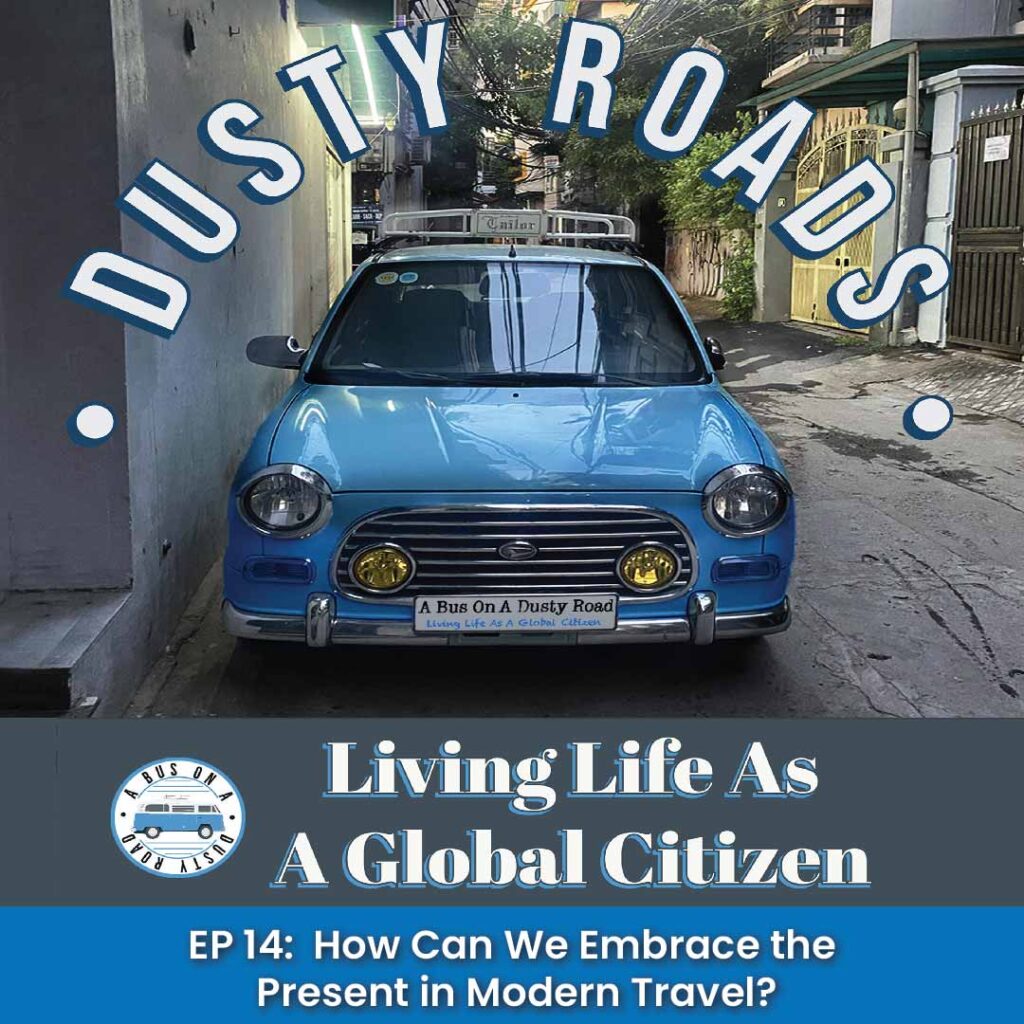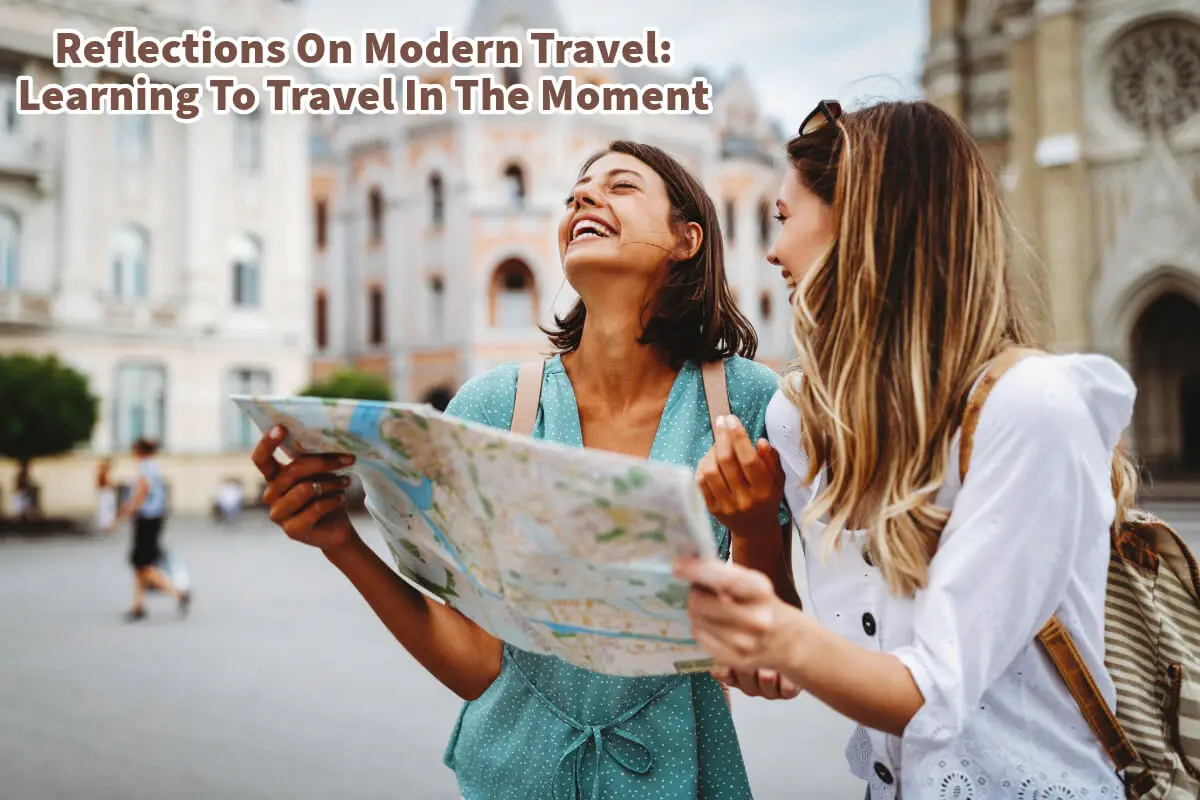Travel has become quite convenient in today’s world. While I enjoy traveling, I’ve observed that it’s a pampered affair for many.
We seek out the best hotels, dine at top-notch restaurants, and ensure we have all the comforts of modern life. Recently, during a conversation with a friend, I remarked on how the world feels closer now, with familiar establishments like Starbucks, Subway, and McDonald’s seemingly everywhere, even across different continents. Travel today is undeniably more accessible than ever before.
Table of Contents
- Travel Today Is Quite A Convenient Affair
- Traveling China In The Mid-1980s – Lesson We Can Learn
- 7 Tips To Learn To Travel To Live In The Moment
- Get Your Face Out Of Your Phone
- Selectivity In Posting:
- Try To Live Without The Internet
- Immerse Yourself In Local Culture
- Forge Local Connections:
- Educate Yourself About The Destination
- Embrace The Unfamiliar
- Listen To Our Podcast About How Can We Embrace the Present in Modern Travel?Below or By clicking here.
- Related Questions
Travel Today Is Quite A Convenient Affair
Travel has become incredibly convenient in today’s world. From my personal experiences, I’ve noticed that traveling has become synonymous with luxury for many people.
We often prioritize staying in the finest hotels, dining at upscale restaurants, and ensuring access to all the modern comforts. In a recent conversation with a friend, I remarked on the closeness that permeates the world now..
Yes, occasional inconveniences exist, such as crowded planes, uncomfortable flights, security checks, and sometimes higher ticket prices. However, overall, travel today is relatively easy for most people.
Here in Hanoi, Vietnam, I often see families with young children, older individuals, backpackers, and luxury travelers. Nearly every country now offers something for everyone, whether you prefer luxury accommodations or a more local experience.
I recall a time when travel was much more challenging. Venturing to another part of the world meant preceding the conveniences of home. Communication with loved ones back home was slow, and receiving news or messages could take weeks.
Those who experienced such travel were true adventurers, navigating the unknown with courage and resilience.

Traveling China In The Mid-1980s – Lesson We Can Learn
As someone who has always had a deep appreciation for travel, exploring the world has been a lifelong passion of mine. Carrying a travel bag has been my second nature for as long as I can remember. I thrive on immersing myself in different countries and cultures and meeting people from diverse backgrounds; it’s ingrained in who I am.
Over the years, I’ve witnessed how travel has evolved. My first significant travel experience was in the mid-1980s when I traveled to China. At that time, China was largely unknown to foreigners, with limited access for travelers. Venturing into the country was an adventure in itself.
You Can Travel Without The Internet
The Internet was in its infancy then, and its widespread usage didn’t occur until later. China didn’t even have internet access until 1989. During those times of travel, staying connected with home was a challenge.
You relied on newspapers, magazines, or occasional letters from home to stay updated on news and events. Despite the lack of instant communication, there was a particular enchantment in disconnecting from your familiar world and fully immersing yourself in the journey.
My travels through China during that era offered comfort far beyond what many of my ancestors experienced in the 1920s, 30s, and early 40s. For them, life in China was vastly different, devoid of modern conveniences that we take for granted today. Their existence in China starkly contrasted with the world I encountered during my travels—an experience that felt like stepping into another realm.

We Live In A World That Is Getting More Homogenized – Seek Out The Unfamiliar.
I share this perspective because it’s easy to feel like everything is becoming homogenized in today’s globalized world. If you travel seeking the familiar comforts of home, such as dining at McDonald’s, you’re missing out on the richness of local experiences. I’ve relished the opportunity to taste and savor local cuisines wherever I go.
Similarly, if you spend your travels glued to your phone or social media, you’re depriving yourself of the authentic experiences that enrich travel.
Instead of immersing yourself in the present moment and engaging with the culture around you, you’re merely skimming the surface of what each destination has to offer. Every day presents an opportunity to embrace new experiences and create lasting memories, and it’s essential to seize those moments fully.

7 Tips To Learn To Travel To Live In The Moment
In my view, the real essence of travel today lies not in its convenience but in immersing oneself in the moment and seeking life-changing experiences.
Here are some tips to help you embark on this transformative journey:
Get Your Face Out Of Your Phone
Resist the urge to bury your face in your phone while traveling. Instead, embrace the world around you. Look up, observe your surroundings, and put your phone away, only using it to capture cherished moments.
Don’t let social media distract you from the authentic experiences waiting to unfold.
Selectivity In Posting:
You don’t need to document every single moment of your journey on social media. Be discerning about what you share, and consider saving some memories to reminisce about later.
Spending excessive time posting online detracts from the essence of travel itself.

Try To Live Without The Internet
Believe it or not, there was a time when people traveled without having Internet access all the time. When traveling, try to live without the Internet and experience your travels. Make it a journey of a lifetime—be present.
Immerse Yourself In Local Culture
Take the plunge and fully immerse yourself in the local culture. Sample exotic cuisines, patronize neighborhood eateries, and opt for local modes of transportation.
Traveling is about experiencing the essence of a place firsthand, not merely observing it from a distance.
Forge Local Connections:
Some of my most memorable travel experiences have resulted from connecting with locals. Take the time to engage with residents, learn about their lives, and gain insights into their perspectives. Building these connections fosters a deeper understanding and appreciation of the destination.
Educate Yourself About The Destination
Delve into your destination’s history, culture, and socio-political landscape. Understanding the context enriches your travel experience and allows you to engage more meaningfully with the local environment.
Don’t be a passive observer; actively seek to comprehend the nuances of the place you’re visiting.
Embrace The Unfamiliar
Every minute of your journey offers an opportunity for discovery and growth. Embrace the unfamiliarity of your surroundings and relish the differences from your home. Traveling is not about comparisons but embracing diversity and the journey itself.
Traveling is undoubtedly a remarkable experience, but it reaches its full potential when you wholeheartedly immerse yourself in every aspect of the journey. Actual travel involves venturing to another country to experience its essence fully. In doing so, you follow in the footsteps of our ancestors who, devoid of modern amenities like the Internet, wholeheartedly embraced the cultures they encountered.
Fully immersing yourself in the travel experience means more than just ticking off landmarks from a checklist. It entails delving deep into a country’s fabric, absorbing its sights, sounds, and flavors. It’s about engaging with locals, understanding their way of life, and forging meaningful connections that transcend borders.
Our ancestors epitomized this immersive approach to travel, navigating foreign lands with an insatiable curiosity and an openness to new experiences. They didn’t rely on technology to guide their journey; instead, they relied on their senses and intuition to navigate unfamiliar terrain.

In today’s hyper-connected world, it’s easy to fall into the trap of experiencing a destination through the lens of a smartphone screen or social media feed. However, actual travel beckons us to disconnect from the virtual world and reconnect with the real one. It encourages us to embrace discomfort, challenge our preconceptions, and step outside our comfort zones.
By immersing ourselves in the travel experience, we honor the legacy of our ancestors and pave the way for transformative journeys that leave an indelible mark on our hearts and minds. So, the next time you embark on an adventure, remember to immerse yourself fully in the experience—to travel genuinely is to live.
Listen To Our Podcast About How Can We Embrace the Present in Modern Travel?
Below or By clicking here.

At A Bus On A Dusty Road, we talk about travel, life, and ex-pat living. We are all about “Living Life As A Global Citizen.” We explore social, cultural, and economic issues and travel.
We would love to have you be part of our community. Sign up for our newsletter to keep up-to-date by clicking here. If you have any questions, you can contact me, Anita, by clicking here.
Listen to our Podcast called Dusty Roads. You can find it on all major podcast platforms. Try out listening to one of our podcasts by clicking here.
Subscribe to our A Bus On A Dusty Road YouTube Channel with great videos and information by clicking here.
Related Questions
What Are Some Lessons On Community Support from The Mongolian Nomadic Herders?
The Mongolian nomadic herders in the Gobi Desert taught me six important lessons about our community support importance. I learned some important lessons about working together as a group and supporting our neighbors while also building a support team that will always be there for us – especially in our time of need. For this to happen, we must each be willing to serve in our communities and work together.
You can discover more by reading our blog 6 Lessons On Community Support from The Mongolian Nomadic Herders by clicking here.
Who Are the Gobi Desert Mongolian Herders Who Use Dirt Bikes?
The Mongolian nomadic family we stayed with had dirt bikes to round up their herds; the husband and wife were University graduates. They choose to live the life of a nomadic herder. They also believed in using as much modern technology as possible, as they had everything from cell phones to computers and television that got decent reception. They had solar panels around the yurt (ger) campsite to charge and use all these electrical appliances.
You can learn more by reading our blog Gobi Desert Mongolian Nomads and their Dirt Bikes by clicking here.
The Benefits And Disadvantage Of Heritage Tourism
There are many benefits and disadvantages to heritage tourism. Heritage tourism can be a fantastic way to discover another culture, location, or history. But if it is done incorrectly, it can be a disaster not just for the culture but also for the society and may bring irreversible environmental issues.
By clicking here, you can discover The Benefits And Disadvantage Of Heritage Tourism.


